This week President Biden formally released his annual budget request to Congress. Elsewhere lawmakers in the Senate explore youth apprenticeship programs.
Biden Administration Sends FY25 Budget Request to Congress
 On Monday, March 11, The Biden administration formally sent its fiscal year 2025 budget (FY25) request to Congress this week. The president asked for $82.4 billion for the U.S. Department of Education (ED)—roughly 4% over FY23 enacted funding levels or about $3.1 billion. Of note for the Career Technical Education (CTE) community, this request proposes a $40 million increase for the Carl D. Perkins Career and Technical Education Act’s (Perkins V) basic state grant program. Advance CTE and the Association for Career and Technical Education (ACTE) released a press statement after the publication of this budget applauding this aspect of the proposal, especially in light of the tight fiscal constraints. The budget is also seeking $32 million in additional funding to expand ED’s ongoing “Career Connected High School” competitive grant initiative– a component of the budget that Advance CTE has continued to raise concerns about. In addition, the ED portion of this FY25 budget is proposing greater investments in career-relevant dual and concurrent enrollment programs.
On Monday, March 11, The Biden administration formally sent its fiscal year 2025 budget (FY25) request to Congress this week. The president asked for $82.4 billion for the U.S. Department of Education (ED)—roughly 4% over FY23 enacted funding levels or about $3.1 billion. Of note for the Career Technical Education (CTE) community, this request proposes a $40 million increase for the Carl D. Perkins Career and Technical Education Act’s (Perkins V) basic state grant program. Advance CTE and the Association for Career and Technical Education (ACTE) released a press statement after the publication of this budget applauding this aspect of the proposal, especially in light of the tight fiscal constraints. The budget is also seeking $32 million in additional funding to expand ED’s ongoing “Career Connected High School” competitive grant initiative– a component of the budget that Advance CTE has continued to raise concerns about. In addition, the ED portion of this FY25 budget is proposing greater investments in career-relevant dual and concurrent enrollment programs.
Elsewhere, the FY25 budget proposal includes a more modest request for the U.S. Department of Labor (DOL), asking Congress for $13.9 billion overall, a roughly 2.3% increase over current funding levels. This part of the budget includes a new $8 billion “Career Training Fund” which would be funded on a mandatory basis over the next 10 years. Per the budget, this fund would provide “…up to $10,000 per worker to support the cost of high-quality, evidence-based training with additional funding for wrap-around supports.” More details regarding this aspect of the proposal are still forthcoming.
The release of the President’s FY25 budget request formally begins the wider federal budget and appropriations process. However, as Advance CTE has previously shared, Congress is still working to finalize full-year FY24 funding, including for Perkins V and other education and workforce development programs. Lawmakers must complete this process by March 22 or pass legislation extending appropriations on another short-term basis. Most recently this week, the Congressional Budget Office (CBO) published a new analysis of the potential impact an across-the-board sequester cut (required by last year’s debt ceiling deal if full-year FY24 funding is not enacted by April 30 this year) would have on non-defense discretionary (NDD) programs like workforce development and education. The CBO is now estimating that this provision would have no impact on NDD programs, reducing a key point of leverage for some factions within Congress to oppose a full-year funding deal.
As these efforts continue to take shape, Advance CTE and partners will continue to advocate for a strong investment in Perkins V as part of both FY24 and FY25 appropriations cycles.
Senate Explores Youth Apprenticeship
On Tuesday, March 12, the Senate Health, Education, Labor, and Pensions (HELP) Committee’s Subcommittee on Employment and Workplace Safety held a hearing entitled, “Youth Apprenticeships: Building Partnerships, Strengthening Career Pathways.” The hearing featured testimony from several youth apprenticeship partners and examined how these programs are currently being implemented across the nation. Broadly, the hearing highlighted how youth apprenticeships and related pathways programs, including CTE, can provide learners with multiple options from K-12 education into postsecondary education and careers. Witnesses and Senators discussed strategies and approaches to expand these opportunities for more learners and ways to ensure program quality.  In particular, Subcommittee Chairman John Hickenlooper (D-CO) and Subcommittee Ranking Member Mike Braun (R-IN) highlighted bipartisan legislation they recently co-sponsored that would broaden access to and funding for youth apprenticeship programs. A video webcast of the hearing and related testimony can be viewed on the Senate HELP webpage.
In particular, Subcommittee Chairman John Hickenlooper (D-CO) and Subcommittee Ranking Member Mike Braun (R-IN) highlighted bipartisan legislation they recently co-sponsored that would broaden access to and funding for youth apprenticeship programs. A video webcast of the hearing and related testimony can be viewed on the Senate HELP webpage.
Steve Voytek, Policy Advisor


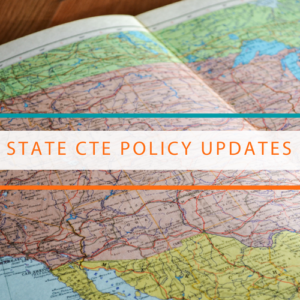 As explained in
As explained in 
 In October 2023, New Hampshire passed
In October 2023, New Hampshire passed  In March 2023, Virginia enacted
In March 2023, Virginia enacted 
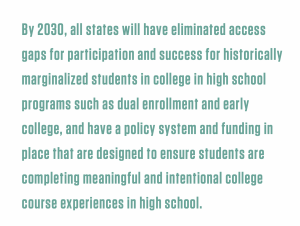
 Relevant Resources
Relevant Resources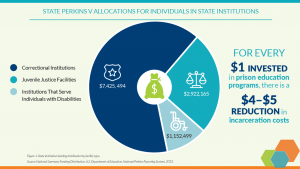
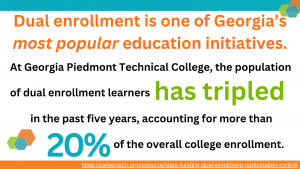
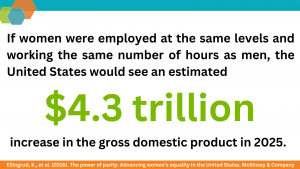
 When was College in High School Alliance (CHSA) established and who were its founders? Was there a catalyst for its inception?
When was College in High School Alliance (CHSA) established and who were its founders? Was there a catalyst for its inception?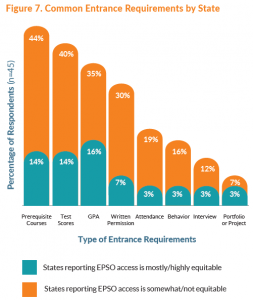 3.Identify and remove barriers to access, including restrictive costs or entrance requirements, and target specific learner populations for recruitment.
3.Identify and remove barriers to access, including restrictive costs or entrance requirements, and target specific learner populations for recruitment. 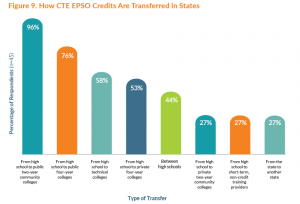 5.Expand statewide and inter-state articulation agreements to account for all types of CTE EPSOs. Statewide agreements can help guarantee recognition of CTE EPSO credit and facilitate automatic transfer between a secondary institution and a corresponding postsecondary institution of the learner’s choice. Ensuring that the transfer of credit is as frictionless as possible is vital to supporting learners as they transition into postsecondary education and continue in a degree program. As states work to ensure that each learner’s EPSO experiences consistently are counted toward articulated credit, they should also ensure that this credit contributes to core credits in a CTE program of study and not just elective credit. States can develop additional guidelines and legislation that ensures the connection between an EPSO and a program of study. Ohio has Career-Technical Assurance Guides (CTAGs) that provide automatically articulated and transferable credit upon completion of CTE coursework.
5.Expand statewide and inter-state articulation agreements to account for all types of CTE EPSOs. Statewide agreements can help guarantee recognition of CTE EPSO credit and facilitate automatic transfer between a secondary institution and a corresponding postsecondary institution of the learner’s choice. Ensuring that the transfer of credit is as frictionless as possible is vital to supporting learners as they transition into postsecondary education and continue in a degree program. As states work to ensure that each learner’s EPSO experiences consistently are counted toward articulated credit, they should also ensure that this credit contributes to core credits in a CTE program of study and not just elective credit. States can develop additional guidelines and legislation that ensures the connection between an EPSO and a program of study. Ohio has Career-Technical Assurance Guides (CTAGs) that provide automatically articulated and transferable credit upon completion of CTE coursework.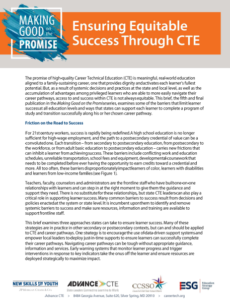 Financial expenses, work commitments, developmental education and healthcare needs are some of the most common barriers to success for community college students, according to a
Financial expenses, work commitments, developmental education and healthcare needs are some of the most common barriers to success for community college students, according to a